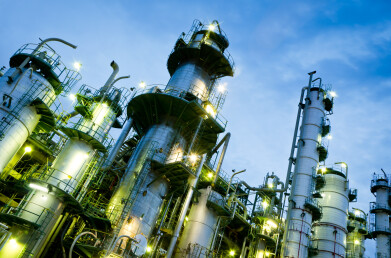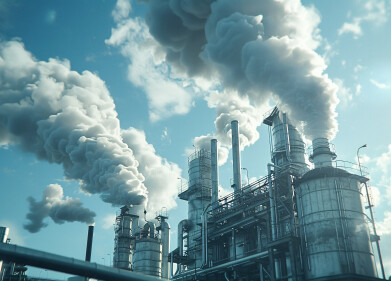Fuel for Thought
Is it even possible to refine petroleum without producing combustible hydrocarbons?
Nov 28 2024
For over a century, oil refining has been inextricably linked with the production of fuels like gasoline, diesel, and jet fuel—products that have powered economies and industries but at a tremendous environmental cost. Yet, the assumption that refining crude oil must inevitably produce combustible hydrocarbons is a myth. With advances in technology and a shift in priorities, refining can evolve into a process that extracts value from hydrocarbons without yielding fuels destined for combustion. This transformation is not just possible but increasingly essential as the world strives for a low-carbon future.
Oil refining is often perceived as a process designed to produce fuels. However, this view overlooks the incredible versatility of crude oil as a raw material. Crude oil is a complex blend of hydrocarbons that can be broken down, restructured, and repurposed into countless products. The refining process itself—encompassing distillation, cracking, and reforming—does not inherently dictate that fuels must be the end products. Instead, the predominance of fuels is a result of historical demand and market dynamics.
Refineries are essentially chemical factories, capable of tailoring outputs to meet specific needs. By adjusting the configurations of key processes, refineries can prioritize the production of non-combustible materials like petrochemicals, lubricants, and polymers. These products are indispensable in industries ranging from construction to electronics, and they offer a way to retain the utility of hydrocarbons without contributing to greenhouse gas emissions.
The production of fuels like gasoline and diesel depends on specific chemical pathways within a refinery. By shifting focus, these pathways can be redirected toward creating durable, non-combustible products. Here’s how:
Refineries start with distillation, separating crude oil into fractions based on boiling points. Lighter fractions, like naphtha, are typically processed into fuels. However, these same fractions can be used to produce olefins and aromatics—key ingredients in plastics, synthetic fibers, and high-performance materials. Adjustments in catalytic cracking and hydrocracking can maximize these outputs, while minimizing light hydrocarbons like propane and butane that are traditionally used as fuels.
Emerging technologies also offer new pathways. Steam cracking, for example, transforms hydrocarbons into ethylene and propylene, the building blocks of most modern plastics. Similarly, Fischer-Tropsch synthesis can convert hydrocarbons into waxes and specialty chemicals rather than fuels. Advanced catalysts are being developed to selectively produce high-value chemicals, bypassing intermediates that lead to combustible hydrocarbons.
Heavy fractions of crude oil, often destined for bunker fuels or residual oils, can instead be diverted to non-fuel uses like asphalt and lubricants. These materials lock carbon into physical forms, extending their lifecycle and keeping emissions at bay. Meanwhile, hydrogen, a critical input in many refining processes, can now be sourced from renewable electricity, further decarbonizing refinery operations.
Transitioning refineries away from fuel production addresses one of the most pressing environmental challenges of our time: carbon emissions. Combustion of fossil fuels accounts for the majority of global CO₂ emissions. By focusing on non-combustible outputs, refineries can eliminate this significant source of greenhouse gases.
Economically, this shift is increasingly attractive. The global demand for durable materials, from advanced polymers to lightweight composites, is growing. These materials are crucial for industries like aerospace, renewable energy, and medical technology. As governments and corporations push for sustainability, refineries that pivot to producing high-value materials will find themselves well-positioned in the emerging circular economy, where resources are reused and recycled.
Furthermore, the infrastructure and expertise of the oil refining industry are assets that can be leveraged in this transition. Refineries are already equipped to process hydrocarbons efficiently and at scale. Redirecting these capabilities toward non-fuel products minimizes the need for entirely new facilities, reducing costs and speeding up the shift.
Transforming oil refining is not without challenges. Existing refineries are optimized for fuel production, and reconfiguring them to prioritize non-combustible outputs requires investment and innovation. Advances in catalyst design, process engineering, and renewable hydrogen integration are critical to making this transition feasible and efficient.
Safety and environmental concerns also need to be addressed. Non-combustible hydrocarbons, while less environmentally damaging than fuels, must be managed responsibly. For example, plastics derived from petrochemicals should fit into a robust recycling system to prevent pollution.
Despite these hurdles, the opportunities are immense. By decoupling refining from fuel production, the industry can redefine its role in the economy. Refineries can become hubs of sustainable material production, supplying the building blocks for a decarbonized world.
Digital Edition
PIN 25.5 Oct/Nov 2024
November 2024
Analytical Instrumentation - Picturing Viscosity – How Can a Viscometer or a Rheometer Benefit You? - Sustainable Grease Formulations: Evaluating Key Performance Parameters and Testing Method...
View all digital editions
Events
Dec 03 2024 Dusseldorf, Germany
Dec 08 2024 Anaheim, CA, USA
Turkey & Black Sea Oil and Gas
Dec 11 2024 Istanbul, Turkey
Dec 19 2024 Aurangabad, India
Jan 20 2025 San Diego, CA, USA



















